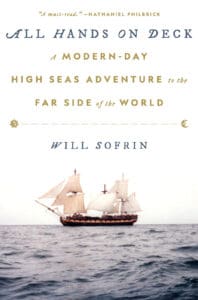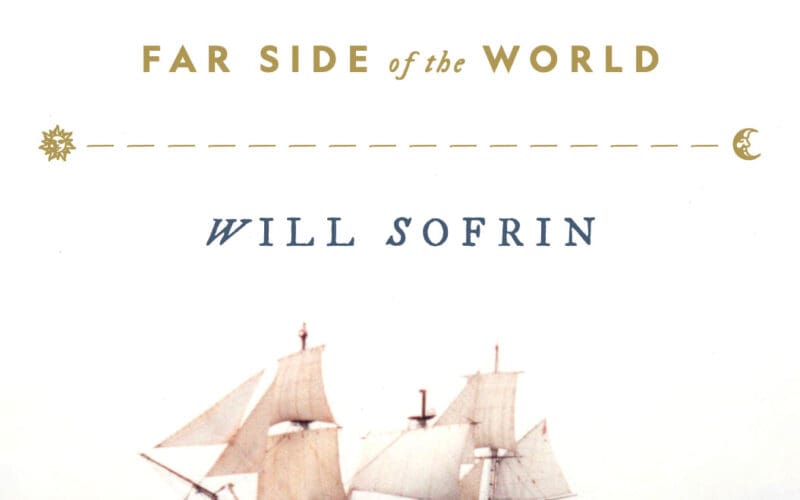 All Hands on Deck: A Modern-Day High
All Hands on Deck: A Modern-Day High
Seas Adventure to the Far Side of the World
by Will Sofrin
Abrams Press—253 pages: $28
Will Sofrin, sailor and shipwright, was a man in a hurry. “The clock was ticking,” he writes. He and the men and women he sailed with had cleared out of Newport on what would be a 36-day, 6,000-mile voyage to California because a production company was waiting to make a movie.
The year: 2002. Sofrin had signed as deckhand on Rose, a replica of an early 19th-century British frigate. The film would be called Master and Commander: The Far Side of the World. “We departed,” the author notes, “with a crew of thirty on a ship of questionable seaworthiness, came close to sinking, and could have died, all while trying to deliver a movie prop.”
The “adventure” Sofrin cites in his book’s subtitle suggests only part of the tale he has to tell. For he breaks frequently into narrative with historical set-pieces on everything from yachts of the America’s Cup and the building of the Panama Canal to the transformation of a onetime London ambulance driver, Richard Russ, into the maritime writer we know today as Patrick O’Brian.
It should be noted that Sofrin’s profile of the famed novelist of Napoleonic-era sea battles is central to his text. For the film adaptation based on the British author’s work recasts the real-life Rose as stand-in for a fictional ship of the Royal Navy in the age of sail. Moreover, the essence of O’Brian’s war epics is the test of courage. And as the vagaries of wind and wave would bring home to the crew of the Rose, that same test applies in the case of crisis at sea.
To this reader, the near-sinking of the auxiliary-powered square-rigger is the heart of Sofrin’s engrossing book. Less than a week out of Newport he and his shipmates would prove their mettle. The Rose had become trapped in an Atlantic storm system of 30-foot seas and wind speeds peaking at 50 knots. In the forepeak, Sofrin reports, he could “see daylight” through openings in plank seams. Beyond the reach of land-based air rescue and with water pouring into the hull, the crew collected survival gear. “If the pumps went down,” he writes, “we went down.” But after a time the thrashing of the vessel began to ease, the pumps held, and they were clear of it.
For Sofrin there had been “no off-switch”: no possibility of taking a break. Fighting to save the ship, he recalls, “forever changed my understanding of how to handle adversity.
“The only way out was through.”
Alan Littell

